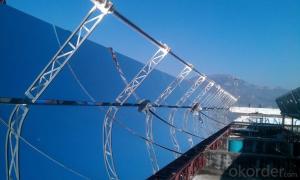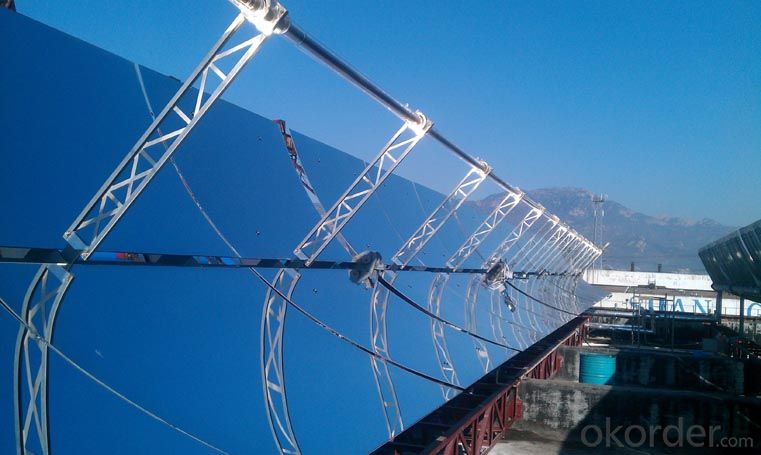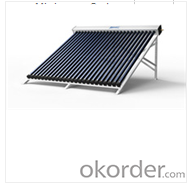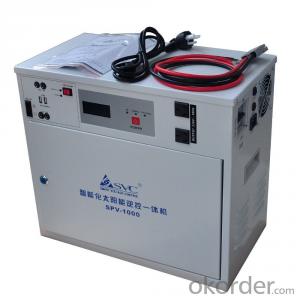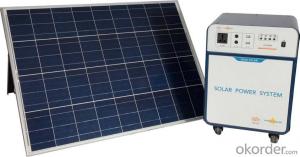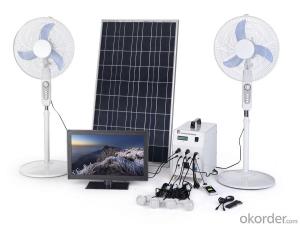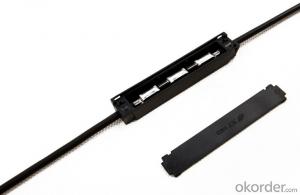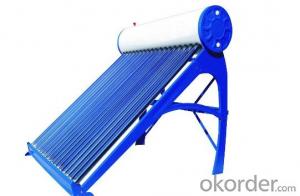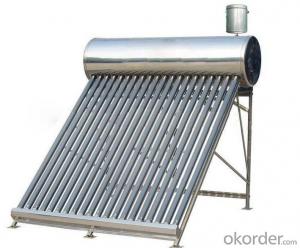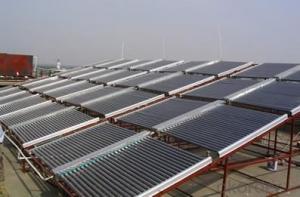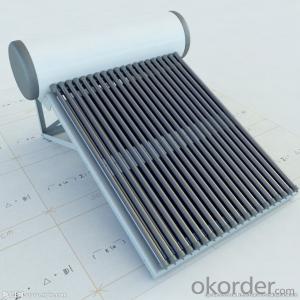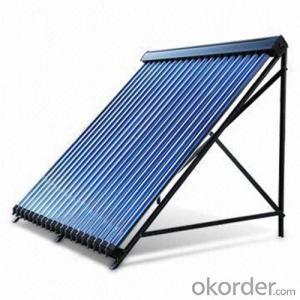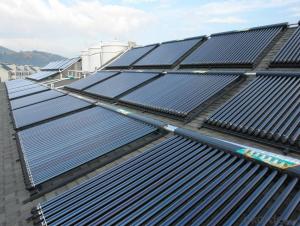Solar Energy Systems Woodbury - Pressurized Solar Collector with Heat Pump
- Loading Port:
- Shanghai
- Payment Terms:
- TT or LC
- Min Order Qty:
- 100 m²
- Supply Capability:
- 100000 m²/month
OKorder Service Pledge
OKorder Financial Service
You Might Also Like
Descritpion:
CNBM Solar is a world-leading and Vertical integrated manufacturer of high-performance with Silicon,
Wafer, Cells, Modules, which convert sunlight into electricity for residential, commercial, and utility-scale
power generation.
The capacity of CNBMSolar is reach to 1GW, and make sure each year our shipment capacity is more
Than 700-800MWs, at the same time, we have set up the largest solar power station with our partner
in Ukraine.
CNBM is a Quality + Service oriented company with“Excellence at Each Step” approach, composed of
the finest components from TUV and IEC-certified partners around the world, CNBM modules consistently
undergo a variety of trials at the company’s Test & Development Centre, ensuring peak performance
capabilities. The company is committed to develop and provide the world with clean and renewable energy
to ease the energy shortages as well as human kind’s impact on the environment.
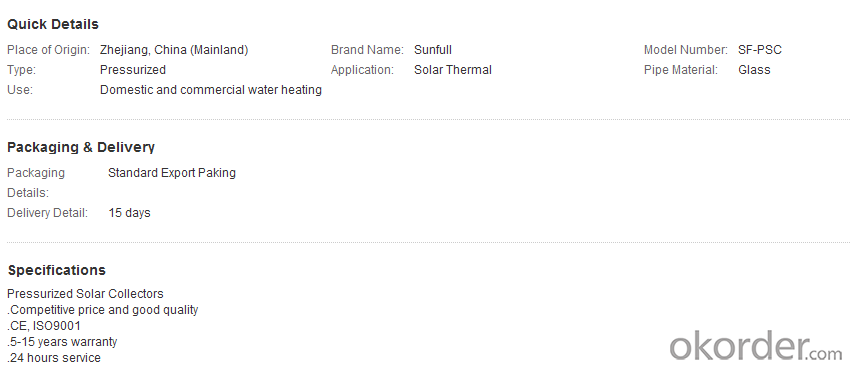
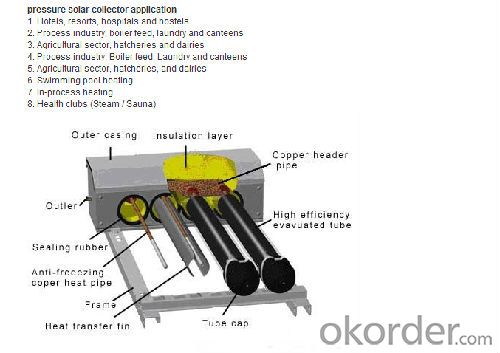
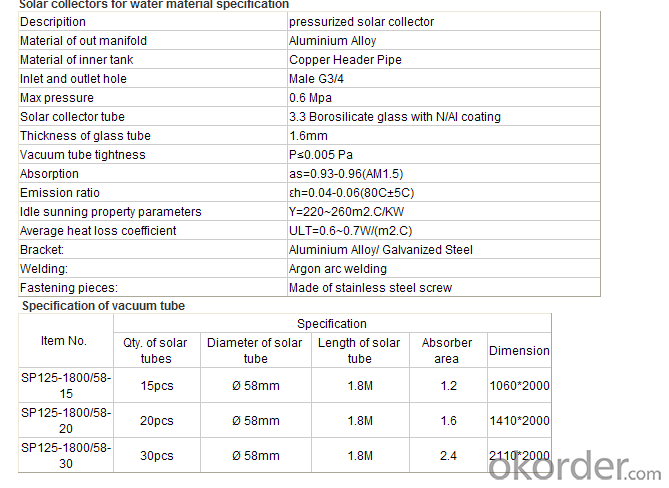
FAQ:What's CNBM's strength?
CNBM Group is short for China National Building Materials Group Corporation, which is established in 1984 with approval from the State Council. It is a China state owned company ,one of Global Fortune 500 .SO,CNBM can get more support from government .
- Q: What is the role of a solar energy system installer?
- The role of a solar energy system installer is to design, install, and maintain solar energy systems for residential, commercial, and industrial buildings. They play a crucial role in the transition towards renewable energy sources and are responsible for ensuring that solar panels are properly installed and functioning efficiently. Firstly, a solar energy system installer evaluates the site where the solar panels will be installed. They assess factors such as the location, orientation, and shading of the site to determine the optimal design and placement of the panels. This involves conducting a thorough analysis of the site's solar potential and considering any potential obstacles that may affect the system's performance. Once the design is finalized, the installer procures the necessary equipment and materials required for the installation. This includes solar panels, inverters, mounting systems, and electrical components. They also ensure compliance with local building codes and regulations. The installation process involves mounting the solar panels on rooftops or on the ground, connecting them to the electrical system of the building, and wiring them to the inverters. Installers must have a strong understanding of electrical systems to ensure safe and efficient connection of the solar panels. After the installation, solar energy system installers conduct thorough testing and commissioning to ensure that the system is functioning properly. This includes checking the electrical connections, monitoring system performance, and troubleshooting any issues that may arise. In addition to installation, solar energy system installers are also responsible for providing maintenance and repair services. They perform regular inspections, clean the panels, and replace any damaged or faulty components to ensure optimal performance and longevity of the system. They may also assist with system upgrades or expansions as needed. Overall, the role of a solar energy system installer is crucial in promoting the adoption of renewable energy. They are responsible for the successful installation and maintenance of solar energy systems, enabling individuals and businesses to reduce their reliance on fossil fuels and contribute to a more sustainable future.
- Q: How does shading affect the performance of solar energy systems?
- Shading has a significant impact on the performance of solar energy systems as it reduces the amount of sunlight reaching the solar panels, thereby reducing their efficiency in generating electricity. Even partial shading on a small portion of the panel can cause a significant drop in the system's output. Therefore, it is crucial to minimize shading, especially during peak sunlight hours, to maximize the performance and overall energy production of solar systems.
- Q: Can solar energy systems be used in powering scientific research vessels or marine laboratories?
- Indeed, it is possible to utilize solar energy systems for the purpose of powering scientific research vessels or marine laboratories. Solar energy, being a renewable and sustainable power source, can be harnessed through the utilization of photovoltaic panels or solar thermal collectors. The energy requirements of research vessels and marine laboratories are substantial, given the nature of their operations which involve scientific experiments, data collection, and analysis. These activities usually involve the use of equipment like computers, sensors, and laboratory instruments, which necessitate a continuous and dependable power supply. To address this need, solar energy systems can be installed on said vessels or laboratories, providing a clean and efficient source of electricity. Through the conversion of sunlight into electricity via photovoltaic panels, the various equipment and systems on board can be powered. Moreover, any excess energy produced by the solar panels can be stored in batteries to be utilized during periods of decreased sunlight or at night. The utilization of solar energy in these marine environments presents numerous advantages. Firstly, it diminishes reliance on fossil fuels and diminishes the carbon footprint associated with conventional methods of power generation. This is particularly vital in the context of scientific research as it aligns with the principles of environmental sustainability and conservation. Secondly, solar energy systems offer a reliable and autonomous power source. Research vessels and marine laboratories often operate in remote or secluded locations where access to traditional power grids may be limited or non-existent. By harnessing solar energy, these vessels and facilities can generate their own electricity, enabling them to continue their research activities without depending on external power sources. Lastly, solar energy systems necessitate minimal maintenance and have a lengthy lifespan. Once installed, they require minimal upkeep and are capable of withstanding the harsh marine environment. This makes them highly suitable for use in research vessels or marine laboratories, where downtime and maintenance issues can be disruptive to ongoing scientific projects. In conclusion, there is no doubt that solar energy systems can be effectively employed to power scientific research vessels or marine laboratories. They offer a sustainable, reliable, and autonomous source of electricity, thereby reducing the carbon footprint and ensuring uninterrupted research activities, even in remote locations.
- Q: Can solar energy systems be used in powering construction sites or temporary structures?
- Yes, solar energy systems can definitely be used to power construction sites or temporary structures. Solar panels can be installed on rooftops or mounted on the ground to harness sunlight and convert it into electricity. This renewable energy source can provide a reliable and sustainable power supply for various construction activities, including lighting, equipment operation, and temporary office setups. Additionally, solar energy systems can be easily transported and set up at different locations, making them ideal for powering temporary structures, such as mobile offices or worker accommodation.
- Q: Can solar energy systems be used in conjunction with battery storage?
- Yes, solar energy systems can be used in conjunction with battery storage. This allows excess solar energy generated during the day to be stored in batteries for later use when the sun is not shining, such as during the night or during cloudy days. Battery storage enables a more reliable and consistent supply of electricity from solar energy, increasing energy independence and resilience.
- Q: Can solar energy systems be used in powering car charging stations?
- Yes, solar energy systems can definitely be used to power car charging stations. In fact, many car charging stations around the world are already powered by solar energy. Solar panels can be installed on the roof or nearby the charging station, which then captures sunlight and converts it into electricity. This renewable energy can be used to charge electric vehicles (EVs) without relying on the traditional power grid. Solar-powered car charging stations offer several advantages. Firstly, they provide a sustainable and clean source of energy, reducing carbon emissions and the overall environmental impact of EVs. Secondly, they can be installed in remote or off-grid locations where it may be challenging or expensive to connect to the electrical grid. This makes solar-powered charging stations particularly beneficial for rural areas or highways that lack easy access to electricity. Furthermore, solar energy systems can be designed to include battery storage, allowing the excess energy generated during the day to be stored and used during the night or during times of high demand. This ensures a continuous and reliable source of power for car charging stations, even when sunlight is not available. Although the initial installation cost of solar energy systems may be higher compared to traditional power sources, they generally have lower operating and maintenance costs in the long run. Additionally, there are various government incentives and rebates available to promote the use of renewable energy, which can help offset these initial costs. Overall, solar energy systems are a viable and sustainable solution for powering car charging stations, offering environmental benefits, energy independence, and cost savings in the long term.
- Q: Can solar energy systems be used in areas with limited access to financing options?
- Yes, solar energy systems can be used in areas with limited access to financing options. There are various financing models and programs available, such as community solar initiatives, power purchase agreements, and government subsidies, which can help make solar energy more accessible to those with limited financial resources. Additionally, innovative financing options like microloans and crowdfunding platforms can also help overcome financing barriers in these areas.
- Q: Can solar energy systems be used for indoor lighting?
- Yes, solar energy systems can be used for indoor lighting. Solar panels can be installed on rooftops or in outdoor areas to capture sunlight, which is then converted into electricity and stored in batteries. This stored energy can be used to power lights indoors, providing a sustainable and cost-effective lighting solution.
- Q: Can a solar energy system be used in areas with limited sunlight?
- Yes, a solar energy system can still be used in areas with limited sunlight. While solar panels do require sunlight to generate electricity, they can still produce power even in areas with less sunlight. Additionally, advancements in solar technology, such as the use of more efficient panels and energy storage systems, have made it possible to harness solar energy in regions with limited sunlight.
- Q: Can solar energy systems be used in powering fire stations or police stations?
- Solar energy systems have the capability to power fire stations and police stations, offering a renewable and sustainable power source that is both reliable and cost-effective. These facilities necessitate a consistent and uninterrupted power supply for crucial functions such as lighting, communication, security systems, and other essential equipment. To harness sunlight and convert it into electricity, solar panels can be installed on rooftops or nearby areas. This electricity can then be utilized to power the various electrical systems within these establishments. By employing solar energy, fire stations and police stations can decrease their dependency on traditional grid electricity, reduce operational costs, and contribute to a greener environment. Moreover, solar energy systems can incorporate battery storage to accumulate excess electricity generated during the day, ensuring an uninterrupted power supply even during periods of low sunlight or at night. Overall, solar energy systems are a practical and feasible option for powering fire stations and police stations, endorsing energy independence and sustainability for these vital public service institutions.
Send your message to us
Solar Energy Systems Woodbury - Pressurized Solar Collector with Heat Pump
- Loading Port:
- Shanghai
- Payment Terms:
- TT or LC
- Min Order Qty:
- 100 m²
- Supply Capability:
- 100000 m²/month
OKorder Service Pledge
OKorder Financial Service
Similar products
Hot products
Hot Searches
Related keywords
